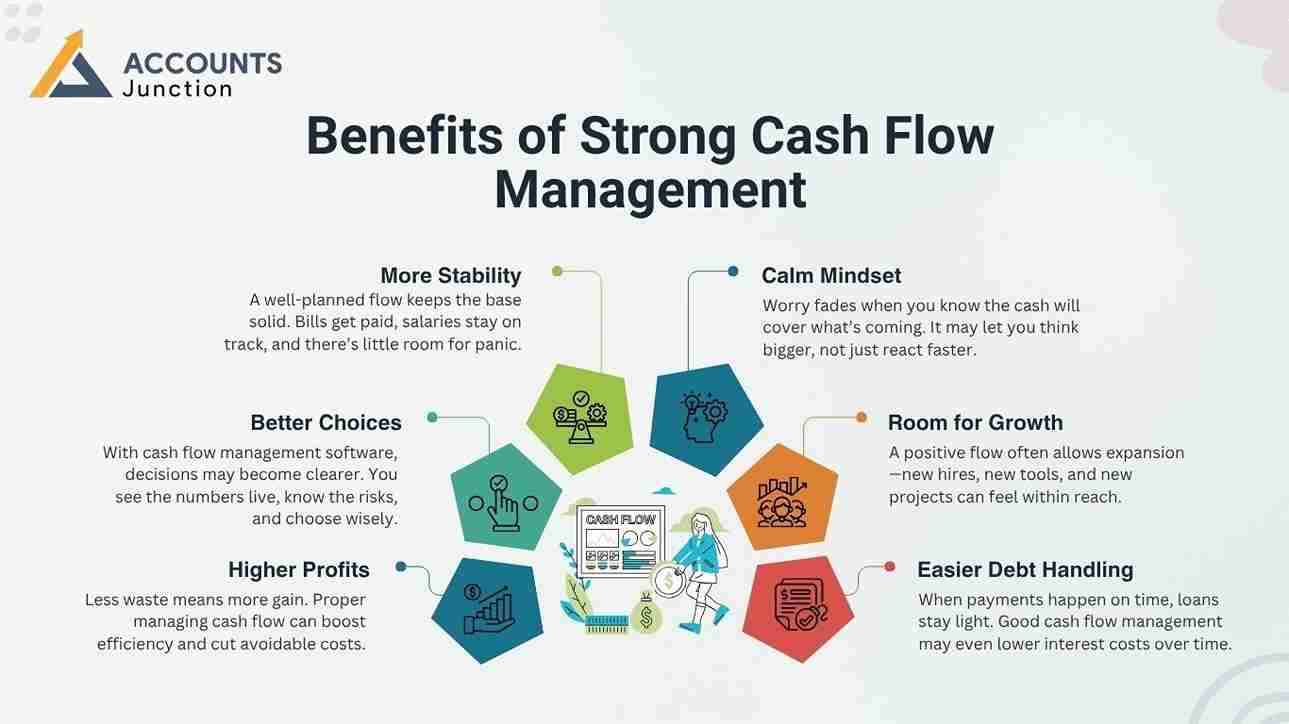
Cash Flow Management: Definition, Aspects and Benefits
Money may come and go, but the way it moves tells the story of every business. Some call it the pulse, some call it the lifeline. Whatever the name, that steady movement of money in and out can make a business rise or stumble. When it flows right, things stay in control. When it doesn’t, even the strongest plans can fall apart. Hence, a proper cash flow management plan is required. It can turn financial issues into a strategy, numbers into insights, and short-term flaws into long-term success.
What Cash Flow Management Means
At its core, cash flow management is about understanding how cash travels within your business. It means keeping a close watch on what comes in and what goes out.
Every sale, every bill, every payment—it all plays a role in how money moves. Managing this flow well may help a business stay healthy, meet its needs, and take bold steps forward.
When done right, cash flow management is not just about survival. It can shape how a business grows. Many now use cash flow management software to track movement in real time. With such tools, it becomes easier to spot gaps, plan better, and make decisions that feel right instead of rushed.
Why Managing Cash Flow is Important
A business may seem fine on the outside—sales rising, profits looking good—but inside, if cash is stuck, it can all crumble fast. That’s why managing cash flow may be one of the most vital parts of running a business.
When cash moves smoothly, everything else tends to fall in place. But if the flow breaks, problems often follow. Let’s look at what proper cash management may bring:
1. Timely Payments
- Smooth cash flow management ensures bills, salaries, and dues are paid on time. It helps keep daily work steady and peaceful.
2. Stronger Bonds
- When payments are never late, suppliers stay happy, employees stay loyal, and trust quietly grows.
3. Room for Opportunity
- A healthy cash position can let a business grab new chances without fear. Whether it’s a new branch or a new tool, opportunities may open up easily.
4. Financial Calm
- Good cash flow management may keep stress low. Owners sleep better knowing tomorrow’s bills won’t break today’s plans.
5. Long-Term Balance
- When cash is planned right, debt stays under control and credit grows stronger. It may set the stage for lasting stability.
The Core Aspects of Managing Cash Flow
Many imagine managing cash flow as a big math task, but it is more like watching tides. It needs patience, timing, and a sense of direction.
Here are some core areas to focus on:
1. Watching Every In and Out
- Every bit that comes in and goes out tells a story. Sales, expenses, supplier bills, loans—all need to be watched closely. Using cash flow management software may make this simpler, showing live updates and clean reports.
2. Budgeting and Forecasting
- A budget is like a map. It may not show every turn, but it can point the way. Forecasting, too, helps predict what’s coming so you can prepare before problems arrive.
3. Managing Receivables and Payables
- Money that comes late can strain the whole system. Faster collections and planned payments can help keep things steady. The right cash flow management software can send reminders, track invoices, and reduce delays.
4. Setting Aside a Cushion
- A backup fund can be a quiet hero. It may save the business during slow sales, sudden repairs, or market changes.
5. Using Technology Smartly
- Relying on manual work alone can be risky. Automation through cash flow management software may reduce errors and free up time for smarter decisions.

The Challenges of Cash Flow Management
Even the best plans can meet rough waters. Many businesses face struggles that come quietly and grow slowly. Here are a few common challenges of cash flow management:
1. Irregular Inflows
- Some businesses earn a lot during one season and little during another. These uneven inflows can make planning hard. Good cash flow management software may help track trends and create stronger plans for slow periods.
2. Poor Expense Control
- Small, unnoticed costs can eat away at profit. Regularly checking expenses may reveal where the money slips away.
3. Overestimating Income
- Hopes may run high, but over-forecasting can create a false sense of safety. A cautious outlook may save you from sudden cash gaps.
4. Delays from Clients
- Late payments often cause more harm than big losses. Automatic reminders and clear payment systems can improve timing.
5. Missing Forecasts
- Without proper forecasting, surprises hit hard. Creating monthly or quarterly reports may keep you ready instead of panicked.
- Knowing these traps is half the battle. Once you see them, you can plan ways around them and build steadier cash cycles.
Benefits of Strong Cash Flow Management
When a business controls its flow, it may not only survive—it can thrive. Below are the brighter sides of strong cash flow management:
1. More Stability
- A well-planned flow keeps the base solid. Bills get paid, salaries stay on track, and there’s little room for panic.
2. Better Choices
- With cash flow management software, decisions may become clearer. You see the numbers live, know the risks, and choose wisely.
3. Higher Profits
- Less waste means more gain. Proper managing cash flow can boost efficiency and cut avoidable costs.
4. Calm Mindset
- Worry fades when you know the cash will cover what’s coming. It may let you think bigger, not just react faster.
5. Room for Growth
- A positive flow often allows expansion—new hires, new tools, and new projects can feel within reach.
6. Easier Debt Handling
- When payments happen on time, loans stay light. Good cash flow management may even lower interest costs over time.
Best Practices to Strengthen Cash Flow
No rule fits all, yet some simple habits can make managing money smoother.
1. Keep Reviewing Regularly
- Regular checks on your cash flow management reports can spot problems early. Many use digital tools for weekly or monthly reviews.
2. Collect Payments Early
- Quick invoicing and small rewards for early payers can help money flow faster.
3. Spend with Care
- Track every payment. Ask if each expense truly adds value. Even a few saved coins may grow over months.
4. Build a Backup Fund
- A small emergency fund can be your safety rope when times get rough.
5. Use Reliable Software
- Manual tracking may miss small details. Automated cash flow management software can handle reminders, reports, and forecasts with ease.
6. Plan for Slow Seasons
- Every business has quiet months. Forecasting and saving during good times may help you glide through the rest.
How Accounts Junction Can Help
At Accounts Junction, we focus on helping businesses shape that balance through strong cash flow management.
Real-Time Tracking
- We help set up cash flow management software that updates instantly. It can show where your money stands, where it’s moving, and what needs attention.
Personalized Financial Planning
- Every company moves differently. Our team studies your flow, then builds a plan that fits your model, size, and goals.
Automated Invoicing and Payment Tracking
- Through automation, invoices get sent on time, payments get recorded, and reminders go out without delay.
Handling Receivables and Payables
- We manage the inflow and outflow sides together, keeping a steady balance between what you owe and what you earn.
Smart Advice and Insight
- Our experts analyze patterns, suggest changes, and guide you toward better liquidity and efficiency.
- With Accounts Junction by your side, you may find not just balance but clarity—and maybe even a touch of calm knowing your finances are in sync.
Money may not solve every business problem, but it surely supports every plan. When cash flow management becomes part of your daily strategy, things may start to feel smoother. It is not just about numbers—it’s about direction, awareness, and timing.
Accounts Junction stands as a helping hand in your cash flow management that can bring stability and growth together.
FAQs
1. What is cash flow management?
- It means tracking how money enters and leaves your business to maintain balance and stability.
2. Why is managing cash flow important?
- It can help you pay bills, reduce stress, and plan better for future growth.
3. How can cash flow management software help?
- It automates tracking, forecasts trends, and offers instant updates for smarter decisions.
4. How often should cash flow be reviewed?
- Weekly or monthly reviews may help you spot issues before they grow.
5. What causes poor cash flow?
- Late client payments, uncontrolled spending, and missing forecasts often lead to it.
6. Can a profitable business face cash problems?
- Yes, even with profit, delayed payments or poor timing can cause shortages.
7. What tools are best for managing cash flow?
- Reliable cash flow management software that tracks, predicts, and reports in real time.
8. How can businesses prepare for slow months?
- By saving during high seasons and adjusting expenses ahead of time.
9. Does technology make cash flow management easier?
- It can simplify complex work, save time, and reduce errors in reports.
10. What happens if cash flow is ignored?
- Unpaid bills, lost trust, and missed chances may follow soon after.
11. Can Accounts Junction help improve cash flow?
- Yes, we set up tools and offer expert services to manage your flow smoothly.
12. What’s a simple way to improve cash flow?
- Send invoices early and collect payments quickly.
13. Should small businesses use cash flow management software?
- Yes, it may help even small firms stay organized and ready for growth.
14. What’s the purpose of forecasting cash flow?
- To prepare for future needs instead of reacting to sudden shortages.
15. Can cash flow affect business growth?
- Yes, steady flow can open doors for new hires, upgrades, and expansion.
16. How do delayed payments affect cash flow?
- They can choke liquidity and slow business operations.
17. Why should expenses be reviewed often?
- Because even small unnecessary costs can drain your reserves over time.
18. Can I handle cash flow manually?
- You can, but automation through cash flow management software saves time and effort.
19. How can I keep my cash flow positive?
- By planning early, tracking closely, and keeping your spending under control.
